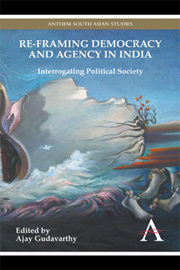Book contents
- Frontmatter
- Contents
- Preface and Acknowledgements
- List of Tables
- Chapter 1 Introduction: Why Interrogate Political Society?
- Part I Political Society and Protest Politics
- Part II Political Society, Middlemen and Mobility
- Chapter 7 The Pyraveekar: The ‘Fixer’ in Rural India
- Chapter 8 Politics of Middlemen and Political Society
- Chapter 9 Widows' Organizations in Kerala State, India: Seeking Citizenship amidst the Decline of Political Society
- Part III Civil Society and/or Political Society
- Part IV Rejoinder
- List of Contributors
Chapter 8 - Politics of Middlemen and Political Society
from Part II - Political Society, Middlemen and Mobility
Published online by Cambridge University Press: 05 June 2012
- Frontmatter
- Contents
- Preface and Acknowledgements
- List of Tables
- Chapter 1 Introduction: Why Interrogate Political Society?
- Part I Political Society and Protest Politics
- Part II Political Society, Middlemen and Mobility
- Chapter 7 The Pyraveekar: The ‘Fixer’ in Rural India
- Chapter 8 Politics of Middlemen and Political Society
- Chapter 9 Widows' Organizations in Kerala State, India: Seeking Citizenship amidst the Decline of Political Society
- Part III Civil Society and/or Political Society
- Part IV Rejoinder
- List of Contributors
Summary
Introduction
Some of the most pressing debates in development studies have concerned the relative merits of states and markets, or the means by which markets might be regulated by a range of public institutions from the local to the global scale. These debates have taken shape, most famously, in the contrasting cases of sub-Saharan Africa and East Asia, and they have an obvious and continuing relevance in countries as diverse as Brazil, Nigeria, India and China. Yet if debate on these issues continues to be fierce, there appears to be general agreement that ‘strong states’ or ‘free markets’ need to be kept in check by vibrant civil societies. Indeed, it is a common proposition in development studies that this hazy zone of ‘freedom’ between the family and the state is a source of unparalleled strength for ordinary men and women, and a source of development itself and even economic growth.
Robert Putman has made this claim as strongly as anyone. His suggestion that economic growth is promoted by a prior build-up of social capital – of people's engagements with a dense network of civic associations – has become a staple of World Bank thinking since the mid-1990s. Even where the causal propositions of Putnam are refused, it is clear that the virtues of civil society are widely admired. Arturo Escobar looks to civil society as a breeding ground for oppositional movements and experiments. It functions for him, and perhaps also for Ashis Nandy in India, as a potential zone of resistance to the dehumanizing claims of developmentalism.
- Type
- Chapter
- Information
- Re-framing Democracy and Agency in IndiaInterrogating Political Society, pp. 171 - 200Publisher: Anthem PressPrint publication year: 2012
- 4
- Cited by



